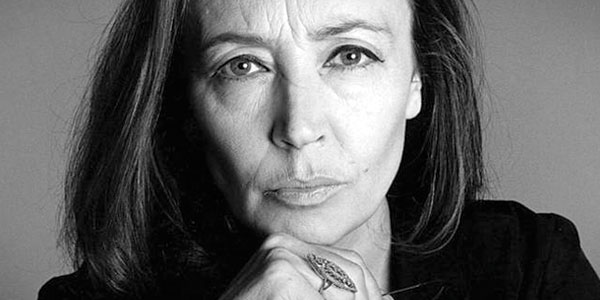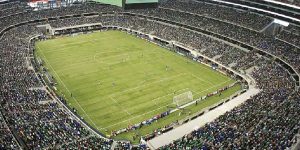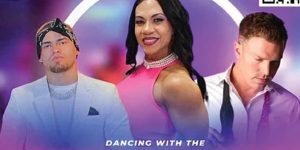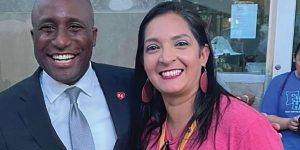
Oriana Fallaci was quite a remarkable interviewer.
For journalists who grew up before the era of computers, the internet and smartphones, few events were more anticipated than the one-on-one interviews conducted by this renowned Italian journalist. She aggressively confronted those in power, and her articles almost always ended in controversy.
While one could have different opinions about La Fallaci, as she was known, it was impossible not to admit that her meetings with powerful figures were demonstrations of journalistic ferocity. Her questions were as sharp as knives. They could end a political career, or cut down a luminary’s fame and reputation. She would prepare obsessively, and her interviews would often touch a raw nerve. Nobody could escape her clever and pointed queries.
“My questions are brutal because the search for the truth is a kind of surgery. And surgery hurts,” she once said, according to the extraordinary biography “Oriana Fallaci: The Journalist, the Agitator, the Legend,” by Cristina De Stefano, recently translated and published in English. “Most of my colleagues don’t have the courage to ask the right questions.”
It’s worth noting that Fallaci was never disrespectful to her subjects — she was merely seeking answers. Her interviews became battlefields, whether she was sitting down with Henry Kissinger, the Ayatollah Ruhollah Khomeini or a Hollywood movie star. “An interview is an extremely difficult thing, a mutual examination, a test of nerves and focus,” Fallaci said, according to De Stefano’s biography. “In my interviews I don’t act only on my opinions, but also on my emotions. All of my interviews are dramas.” She continued: “I’m the one interpreting the facts. I always write in the first person. And what am I? I’m a human being.”
You always knew what Fallaci wanted to learn — her intentions and meanings were clear and simple. “I detest difficult words, complicated and impenetrable,” she said with regard to her interviewing process. “I learned to detest them from my mother, who was highly intelligent but not highly educated … My mother used to say, ‘Write simply, please!
I want to understand as well.’”
Fallaci also understood that defiance was a fundamental trait for a journalist. “To me, being a journalist means being disobedient,” she wrote to a colleague. “And being disobedient means being in opposition. In order to be in opposition, you have to tell the truth.” It’s interesting how Fallaci believed that rulers and powerful people were (almost) always unable to tell the truth, so she had to get it out of them by posing her probing questions.
Fallaci was also brave, and she knew it. “Courage is one of my few virtues,” she acknowledged. She also never considered herself a mere witness to history: “Journalists do no simply recount events. They create events. Or at least they provoke them.”
She also covered many wars, and was always against them. “War accomplishes nothing,” a character in one of Fallaci’s novels said. “It resolves nothing. As soon as it ends, you realize that the reasons for which it was fought have not disappeared or that new reasons have taken the place of the old.”
She thought journalists needed to become fully involved, and envelop themselves in the age they live in. Toward the end of her life (she died of cancer in 2006), Fallaci made the greatest mistake of her career. After the Sept. 11, 2001, terrorist attacks, she published some anti-Muslim essays that were full of prejudice and rage. And that’s unforgivable.
But Fallaci never cared much about what other people thought of her. She was an imposing figure until the end, and not very accessible. According to De Stefano’s biography, Fallaci hated it when strangers, even fellow journalists, knocked on her door in New York City. I got the same sense when I spotted her at a distance in a hotel lobby in Dhahran, Saudi Arabia, while reporting on the Gulf War in 1991. I didn’t dare approach her to say how much I admired her work.
I’ve always regretted not talking with her. And since then, I’ve promised myself I would never again remain silent. Beyond that, before every major interview I conduct these days, I almost always think to myself: “What would La Fallaci ask?”
(Jorge Ramos, an Emmy Award-winning journalist, is a news anchor on Univision.)
Las Preguntas de Oriana Fallaci
Oriana Fallaci fue una gran preguntadora.
Para los periodistas que crecimos antes de las computadoras, la internet y los celulares, había pocas cosas que crearan más expectativa que la publicación de una entrevista de la reportera italiana. Se enfrentaba al poder como pocas y sus reportajes, casi siempre, terminaban en controversia. Uno podía pensar muchas cosas de La Fallaci, como le decían, pero era inevitable calificarla de valiente para esos encuentros con los poderosos.
Sus preguntas eran como un cuchillo. Cortaban. A veces terminaban con carreras. Y siempre golpeaban la fama y la reputación. Nadie se salvaba del látigo de sus puntiagudas interrogaciones. Preparaba sus preguntas pacientemente; eran precisas y tocaban donde más dolía. “Mis preguntas son brutales porque la búsqueda de la verdad es como una cirugía. Y las cirugías duelen. La mayoría de mis colegas no tienen el valor de hacer las preguntas correctas,” decía, según cuenta la investigadora Cristina de Stefano en su extraordinario libro “Oriana Fallaci: La Periodista, La Agitadora, La Leyenda” (recientemente traducido al inglés).
No insultaba, solo preguntaba.
Sus entrevistas eran una guerra. Igual con el exsecretario de estado, Henry Kissinger, y el Ayatola Ruhollah Khomeini que con los actores más conocidos de Hollywood. “Una entrevista es algo extremadamente difícil, una examinación mutua, una prueba de nervios y de concentración”, dijo. “En mis entrevistas no solo uso mis opiniones sino también mis emociones. En todas mis entrevistas hay drama. … Soy yo quien interpreto los hechos. Siempre escribo en primera persona. ¿Qué soy yo? Un ser humano”.
Uno siempre sabía lo que Fallaci quería preguntar. Claridad ante todo; lo opuesto a esos entrevistadores que usan palabras rebuscadas y discursos interminables. “Detesto las palabras difíciles, complicadas e impenetrables”, explicó una vez. “Y aprendí a detestarlas debido a mi madre, quien era una mujer muy inteligente pero sin mucha educación formal … Mi madre siempre decía: ‘Escribe con sencillez, por favor. Yo también quiero entender.’”
Fallaci entendía que una característica .
fundamental de todo buen periodista era desobedecer. “Para mí, ser periodista significa ser desobediente”, le escribió a un colega. “Y ser desobediente significa estar en la oposición. Y para estar en la oposición, tienes que decir la verdad”. Es interesante como, para ella, la verdad (casi) nunca podía salir de los gobernantes o los poderosos. Por eso había que arrancárselas. Con preguntas.
Fallaci fue una periodista muy desobediente y muy valiente. Y ella lo sabía. “El coraje es una de mis pocas virtudes”, reconoció. Y nunca se pensó como una simple testigo de la historia. “Los periodistas no sólo cuentan los eventos. También los crean. Los provocan”.
Cubrió muchas guerras pero siempre estuvo opuesto a ellas. “La guerra no sirve para nada”, dice el personaje de uno de sus libros de ficción. “No resuelve nada. Tan pronto como termina (una guerra), te das cuenta que las razones por las que se peleó no han desaparecido o que hay nuevas razones que han reemplazado los viejos argumentos”.
Para ella el periodista tenía que involucrarse, embarrarse y enlodarse en el lugar y en el tiempo que le tocó vivir.
Fue así que Fallaci cometió el error más grande de su carrera. En sus últimos años, antes de morir de cáncer en septiembre del 2006, Fallaci publicó varios escritos antimusulmanes, cargados de prejuicios y de rabia. Y eso es imperdonable.
Pero a Fallaci no le importó mucho lo que pensáramos los demás. Era una mujer que imponía y que no parecía muy accesible. Odiaba, cuenta el libro, que extraños y periodistas tocaran la puerta de su apartamento en Nueva York. Esa es la misma impresión que yo tuve cuando la vi, desde lejos, en el lobby de un hotel en Dhahran, Arabia Saudita, durante la cobertura de la Guerra del Golfo Pérsico en 1991. No me atreví a acercarme y decirle que admiraba su trabajo periodístico.
Siempre me he arrepentido de no haberme atrevido a hablarle. Pero aprendí. Desde entonces me prometí a que nunca más me quedaría callado. Y ahora, antes de cada entrevista importante, casi siempre pienso: ¿Qué hubiera preguntado La Fallaci?
(Jorge Ramos, periodista ganador del Emmy, es el principal director de noticias de Univision Network. )









